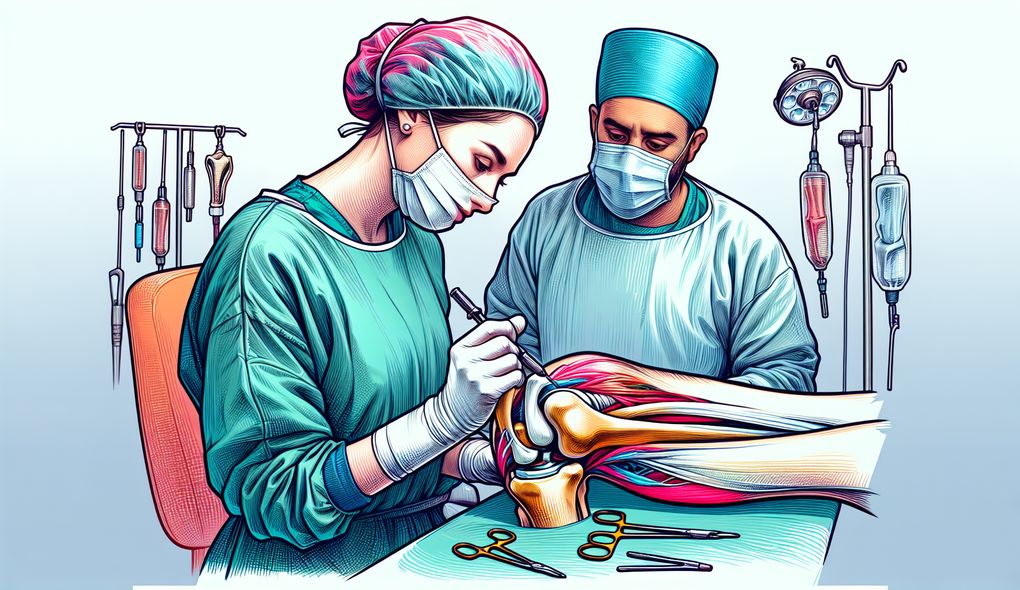What strategies do you use to effectively supervise and mentor junior doctors, residents, and medical students?
INTERMEDIATE LEVEL

Sample answer to the question:
To effectively supervise and mentor junior doctors, residents, and medical students, I believe in creating a supportive and collaborative environment. I start by establishing clear expectations and providing regular feedback to ensure their growth and development. I also encourage open communication and team collaboration to foster a culture of learning. Additionally, I involve them in hands-on experiences and guide them through complex cases to enhance their clinical skills. Moreover, I organize educational sessions and workshops to impart knowledge and update them on the latest advancements in orthopedic surgery. By providing mentorship and creating opportunities for their professional growth, I aim to empower them to become skilled and confident practitioners.
Here is a more solid answer:
To effectively supervise and mentor junior doctors, residents, and medical students, I employ a comprehensive approach that encompasses various strategies. Firstly, I establish a strong foundation built on mutual respect and open communication, where they feel comfortable approaching me with questions and concerns. I provide regular feedback, highlighting their strengths and areas for improvement, to ensure continuous growth and development. I also create opportunities for hands-on experience, allowing them to participate in surgeries and learn through observation and guidance. This not only enhances their clinical skills but also boosts their confidence. Additionally, I organize educational sessions and case discussions to impart knowledge and keep them updated on the latest advancements in joint replacement surgery. By actively involving them in decision-making and patient care, I foster a sense of ownership and accountability. Through these strategies, I aim to inspire and empower them to become skilled orthopedic surgeons.
Why is this a more solid answer?
The solid answer provides more specific details and examples of the strategies used to effectively supervise and mentor junior doctors, residents, and medical students. It covers the main evaluation areas and demonstrates the candidate's understanding of the importance of communication, hands-on experience, and continuing education in mentoring. However, it could still be improved by providing more specific examples of how the candidate has implemented these strategies in past experiences.
An example of a exceptional answer:
Effectively supervising and mentoring junior doctors, residents, and medical students requires a multifaceted approach that I have honed through my experience. Firstly, I establish a positive and inclusive environment where they feel comfortable asking questions and sharing ideas. I conduct regular one-on-one meetings to provide personalized feedback and guidance tailored to their specific needs and goals. Additionally, I recognize the importance of hands-on experience in their development, so I actively involve them in surgeries, starting with observing and gradually allowing them to take on more responsibility under my supervision. I also organize workshops and conferences, both internally and externally, to expose them to the latest research and advancements in joint replacement surgery. Moreover, I encourage them to collaborate with other specialties and participate in research projects, fostering their holistic growth as medical professionals. By combining these strategies, I aim to not only impart knowledge but also inspire and empower them to become compassionate, skilled, and confident orthopedic surgeons.
Why is this an exceptional answer?
The exceptional answer provides a comprehensive and detailed approach to supervising and mentoring junior doctors, residents, and medical students. It covers all the evaluation areas in depth, demonstrating the candidate's expertise and understanding of effective mentoring strategies. The candidate provides specific examples of how they have implemented these strategies in the past and how it has contributed to the growth and development of their mentees. The answer also highlights the importance of collaboration, research, and personalization in the mentoring process. Overall, it showcases the candidate's ability to create a supportive and empowering environment for junior medical professionals.
How to prepare for this question:
- Reflect on your past experiences supervising and mentoring junior doctors, residents, or medical students. Identify specific examples that highlight your successful strategies and results.
- Research current trends and advancements in joint replacement surgery to stay updated and provide valuable knowledge to your mentees.
- Familiarize yourself with effective communication and feedback techniques to effectively guide and support your mentees.
- Consider how you can create inclusive and collaborative environments where your mentees feel comfortable and empowered to learn and grow.
- Think about ways to involve your mentees in hands-on experiences, such as surgeries or research projects, to enhance their skills and confidence.
What are interviewers evaluating with this question?
- Supervision and mentoring
- Communication and collaboration
- Hands-on experience
- Continuing education

